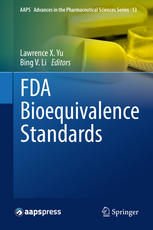

Most ebook files are in PDF format, so you can easily read them using various software such as Foxit Reader or directly on the Google Chrome browser.
Some ebook files are released by publishers in other formats such as .awz, .mobi, .epub, .fb2, etc. You may need to install specific software to read these formats on mobile/PC, such as Calibre.
Please read the tutorial at this link: https://ebookbell.com/faq
We offer FREE conversion to the popular formats you request; however, this may take some time. Therefore, right after payment, please email us, and we will try to provide the service as quickly as possible.
For some exceptional file formats or broken links (if any), please refrain from opening any disputes. Instead, email us first, and we will try to assist within a maximum of 6 hours.
EbookBell Team

5.0
30 reviewsThis comprehensive reference provides an in-depth discussion on state-of-the-art regulatory science in bioequivalence. In sixteen chapters, the volume explores a broad range of topics pertaining to bioequivalence, including its origin and principles, statistical considerations, food effect studies, conditions for waivers of bioequivalence studies, Biopharmaceutics Classification Systems, Biopharmaceutics Drug Disposition Classification System, bioequivalence modeling/simulation and best practices in bioanalysis. It also discusses bioequivalence studies with pharmacodynamic and clinical endpoints as well as bioequivalence approaches for highly variable drugs, narrow therapeutic index drugs, liposomes, locally acting gastrointestinal drug products, topical products and nasal and inhalation products.
FDA Bioequivalence Standards is written by FDA regulatory scientists who develop regulatory policies and conduct regulatory assessment of bioequivalence. As such, both practical case studies and fundamental science are highlighted in these chapters.The book is a valuable resource for scientists who work in the pharmaceutical industry, regulatory agencies and academia as well as undergraduate and graduate students looking to expand their knowledge about bioequivalence standards.